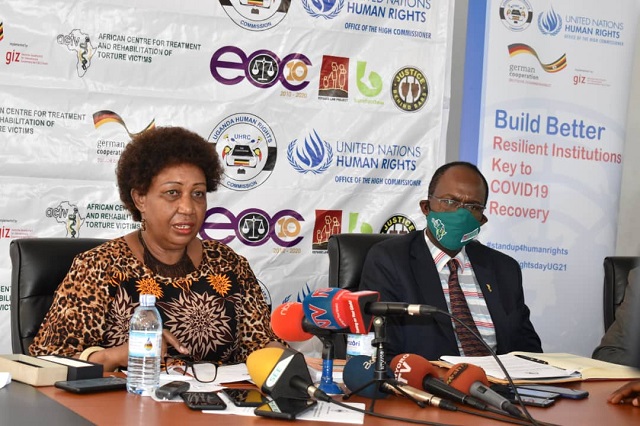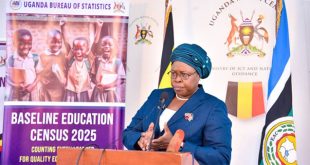
Kampala, Uganda | THE INDEPENDENT | The Uganda Human Rights Commission-UHRC has closed the files of 18 supporters of the National Unity Platform-NUP Party reported missing in the period from 2020 to 2023. These were part of a list of 30 persons the commission recieved from the NUP Secretariat and commenced investigations.
Some of the people on the list were reportedly taken away by security in the infamous drones. Mariam Wangadya, the Commission Chairperson, has revealed that during their investigations, they were unable to trace 18 out of the 30 people who were listed as missing. Speaking at the Commission’s offices in Kampala on Tuesday, Wangadya mentioned that they had contacted various security agencies and visited detention facilities in search of the missing persons, but their efforts were unsuccessful.
She said the NUP didn’t provide NIN numbers to the commission making it hard for them to even confirm that the names provided have registered faces attached to them. While acknowledging the critical nature of this issue, Wangadya also emphasized that the commission encountered challenges after contacting the known next of kin to the missing persons who were uncooperative with the investigators.
She said that some outrightly refused to discuss with the investigators, while others displayed a lack of interest in assisting with the investigative process. According to Wangandya, based on the given facts, the commission has decided to close the files, saying that any further investigations would be futile.
The 18 persons are Moses Mbabazi alias Kawenja, Dennis Zzimula, Shafik Wangolo, Martin Lukwago, Peter Kirya, John Ddamulora, Micheal Semuddu, Muhammad Kanatta, and Johnbosco Kibalama. Other are; Vincent Nalumonso, Yuda Sempijja alias Patrick, Musisi Mbowa, Musirafa Luwemba, Hassan Mubiru, Isma Ssesaazi, Godfrey Kisembo, George Kasumba and Joseph Baguma.
She further told journalists that 12 of the people on the list were not missing, rather, had been arrested and detained by security agencies on charges such as terrorism, vandalism of electricity installations, and murder. They are Patrick Ahumuza, Steven Muleme, Jamushid Kavuma, Godfrey Krumira Marvin, Charles Ntale alias Muhammad, and Haruna Badru Sonko. Also Abdu-Bayan Baguma, Khalid Ssebi, Alex Kabugo, Yasin Ssebunya, Fred Kagimu and Sadat Sadam Mubiru.
She said, that during investigations, they reached out to the listed persons or their next of kin through their mobile contacts as provided by NUP. The contacted persons revealed that the arrested individuals had been released on police bond or court bail, she said.
According to the report, several of the 12 persons were arrested by army officers from the Uganda People’s Defence Force-UPDF or armed men covered with masks, and detained at the Chieftaincy of Military Intelligence headquarters before they were taken to police stations and later presented before courts. Some even alleged torture at the hands of security personnel.
However, Wangadya said only four of the 12 persons, namely Patrick Ahumuza, Charles Ntale, Haruna Badru Ssonko, and Sadat Sadam Mubiru were willing to have their cases investigated further as the majority declined to record statements with the commission. She said those who declined to record statements also asked that their files be closed. She, however, couldn’t tell why these refused to have their cases investigated further. Wangadya noted that NUP has previously reported complaints to the Commission of alleged torture of its supporters who have either not been cooperative or have changed the narrative of their allegations while some alleged torture victims have turned out to be accident victims.
Rtd Col. Steven Basaliza, one of the commissioners opined that the people could have feared to come out because of the gravity of the cases against them. He however said that their interest as a commission is not in the charges but rather the question of them being or having been missing because that is the scope of their investigations.
Meanwhile, Aidah Nakiganda Director of Complaints, Investigations & Legal Services called upon arresting officers to always identify themselves before conducting arrests and only detain people in designated places. Often, security personnel arrest people without identifying themselves, sometimes while not in uniform and detain them in undesignated detention centers. This has been witnessed especially with suspects of terrorism and murder or where there is political party politics involved.
Rubongoya acknowledged that he had received a response from the commission. Despite his disagreement with the findings, he recognized some valid points in light of the commission’s statement, which pointed out that the individuals discussed had been in custody for longer than the constitutionally prescribed 48 hours. “As you notice from her own list, all these persons without exception were in detention for close to or over a month- much longer than the prescribed 48 hours! The Commission does not condemn or even say anything about this blatant violation of citizens’ rights! At her press conference, she even mentioned that some of these people were detained by CMI and “other security agencies” when she knows clearly those are not places gazetted by law,” said Rubongoya
The Secretary-General also mentioned that abductions have been occurring continuously, and the number of missing persons has now exceeded the initial 18 who were listed as still missing. In his perspective, they had anticipated the rights body to take more extensive actions beyond what is outlined in their report, but he commented, “This is Uganda,” implying a recognition of the challenging circumstances. He further stated, “We are determined to pursue justice and accountability relentlessly.”
 The Independent Uganda: You get the Truth we Pay the Price
The Independent Uganda: You get the Truth we Pay the Price



